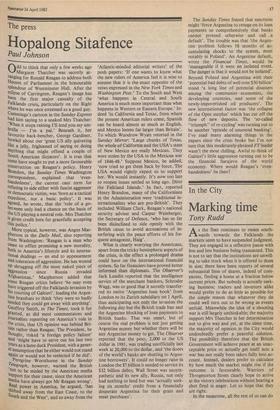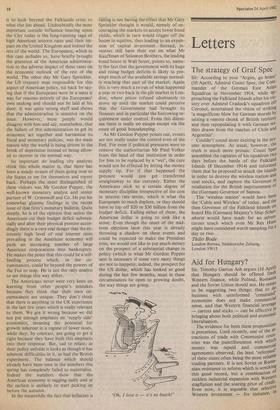In the City
Marking time
Tony Rudd
As the fleet continues to steam south- wards towards the Falklands the markets seem to have suspended judgment. They are engaged in a reflective pause with less and less business being transacted. This is not to say that the institutions are unwill- ing to take stock when it is offered to them in size; there have been reports of several substantial lines of shares, indeed of com- panies, finding a home at a fraction below current prices. But nobody is actually seek- ing business; traders and investors alike would prefer to do as little as possible for the simple reason that whatever they do could well turn out to be wrong as events unfold. Meanwhile the idea of a shooting war is still largely unthinkable; the majority support Mrs Thatcher in her determination not to give way and yet, at the same time, the majority of opinion in the City would undoubtedly prefer a peaceful solution. The possibility therefore that the British Government will achieve peace at an unac- ceptable price or actually get itself into a war has not really been taken fully into ac- count. Instead, dealers prefer to calculate by how much the market might rise if the outcome is favourable. Warriors of Throgmorton Street clearly hope to arrive at the victory celebrations without hearing a shot fired in anger. Let us hope that they are right.
In the meantime, all the rest of us can do is to look beyond the Falklands crisis to what else lies ahead. Undoubtedly the most important outside influence bearing upon the City today is the long-running saga of high American interest rates and their im- pact on the United Kingdom and indeed the rest of the world. The Europeans, which in this case includes us, have briefly brought the attention of the American administra- tion to the adverse impact of these rates on the economic outlook of the rest of the world. The other day Mr Gary Sprinkler, the US treasury man responsible for this aspect of American policy, hit back by say- ing that if the Europeans were in a mess it was for reasons entirely of the Europeans' own making and should not be laid at his door. It was quite strong stuff and shows that the administration is sensitive on the issue. However, most people would disagree with him and say, nonetheless, that the failure of this administration to get its economic act together and harmonise its fiscal and monetary policies, was the main reason why the world is being driven to the brink of depression instead of being allow- ed to recover in the normal way.
So important do leading city analysts think this whole matter is, that there has been a steady stream of them going over to the States to see for themselves and report back. Perhaps the most distinguished of these visitors was Mr Gordon Pepper, the well-known monetary analyst and senior partner of W. Greenwell and Co. He put his somewhat gloomy findings in the recent issue of that firm's monetary bulletin. Quite simply, he is of the opinion that unless the Americans cut their budget deficit substan- tially and alter their physical posture accor- dingly there is a very real danger that the ex- tremely high level of real interest rates prevailing in the American economy will push an increasing number of large American corporations into bankruptcy. He makes the point that this could be a self- feeding process which, in the cir- cumstances, could be beyond the powers of the Fed to stop. He is not the only analyst to see things this way either.
The Americans never were very keen on learning from other people's mistakes because they think that their own cir- cumstances arc unique. They don't think that there is anything in the UK experience in the last few years which is really relevant to them. We got it wrong because we did not put enough emphasis on 'supply side' economics, meaning the potential for growth inherent in a regime of lower taxes, while they, by contrast, are going to get it right because they have built .this emphasis into their response. But, sad to relate, as their policy unfolds it looks as though it has inherent difficulties in it, as had the British experiment. The balance which should already have been seen in the numbers this spring has completely failed to materialise. Indeed the numbers show that the American economy is sagging sadly and at the earliest is unlikely to start picking up before the autumn.
In the meanwhile the fact that inflation is falling is not having the effect that Mr Gary Sprinkler thought it would, namely of en- couraging the markets to accept lower bond yields, which in turn would trigger off the boom in equities, thus leading to an expan- sion of capital investment. Instead, in- vestors still have their eye on what Mr Kauffman of Solomon Brothers, the leading bond house in Wall Street, points to, name- ly the fact that the government with its huge and rising budget deficits is likely to pre- empt much of the available savings normal- ly reaching that part of the market. Again this is very much a re-run of what happened a year or two back in the gilt market in Lon- don, where prices refused obstinately to move up until the market could perceive that the Government had brought its finances and in particular the borrowing re- quirement under control. From this dilem- ma there is really no escape except via the route of good housekeeping.
As Mr Gordon Pepper points out, events are not really under the control even of the Fed. For even if political pressures were to remove the authoritarian Mr Paul Volker from the head of that institution in order for him to be replaced by a 'wet', the cure would not be effected by letting the money supply rip. For if that happened the pressure would just get transferred straightaway to the currency. Either the Americans stick to a certain degree of monetary discipline irrespective of the cost in interest rate terms, which is what the Europeans so much deplore, or they should have to lop off $20 or $30 billion from the budget deficit. Failing either of these, the American dollar is going to sink like a stone. Even though the onset of the mid- term elections later this year is already throwing a shadow on these events and could be expected to make the President trim, we would not like to put much money on the prospect of a substantial change in policy (which is what Mr Gordon Pepper says is necessary if some very nasty things are not to happen); indeed, the prospect for the US dollar, which has looked so good during the last few months, must in these circumstances be open to growing doubt, the way things are going.
'Oh, I love it — it's so butch?'







































 Previous page
Previous page